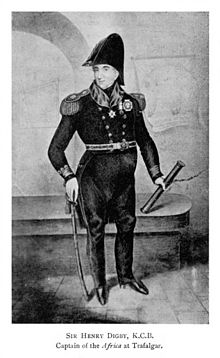Henry Digby (admiral)
| Sir Henry Digby | |
|---|---|
 |
|
| Born | 20 January 1770 Bath, England |
| Died | 19 August 1842 Sheerness, Kent, England |
| Allegiance |
|
| Service/branch |
|
| Rank | Royal Navy Rear-Admiral |
| Commands held |
HMS Incendiary HMS Aurora HMS Leviathan HMS Alcmene HMS Resistance HMS Africa Nore Command |
| Battles/wars |
French Revolutionary Wars Napoleonic Wars |
| Awards | Knight Grand Cross of the Order of the Bath |
Admiral of the Blue Sir Henry Digby GCB (20 January 1770 – 19 August 1842) was a senior British naval officer, who served in the French Revolutionary and Napoleonic Wars in the Royal Navy. Born into a long-established naval family, his uncle was the famous Admiral Robert Digby, Henry went to sea at the end of the American Revolutionary War aged fourteen.
As a lieutenant aboard HMS Pallas, he received a commendation for rescuing the crew of a burning ship. Promoted to commander in August 1795 and captain in December 1796, Digby established a reputation as an aggressive prize taker, capturing 57 ships in less than twenty months. His richest capture came in October 1799 when he assisted in the taking of the treasure ship, the Santa Brigida. He commanded HMS Africa at the Battle of Trafalgar, manoeuvering her into the French and Spanish fleet against orders, having been instructed by Nelson to avoid battle, fearing Digby's small ship of the line would be overwhelmed.
In 1806 Digby married Lady Jane Elizabeth Coke, daughter of Thomas Coke, 1st Earl of Leicester, with whom he had three children. They moved to the estate in Dorset inherited from his uncle where the prize money amassed by Digby paid for a comfortable life. He continued to serve in the navy, was appointed Commander in Chief, Sheerness and attained the rank of admiral in 1841.
The nephew of Robert Digby, Henry was born in Bath on 20 January 1770. His father, the Hon. Rev. William Digby, was the younger brother of Edward Digby, 6th Baron Digby and later became Dean of Durham and Chaplain Ordinary to King George III. Henry was one of ten children and the oldest of four boys; two of whom, Charles George (1780) and Joseph (1786), also served in the Royal Navy. The younger, Joseph, later becoming a vice-admiral. On 2 April 1783, Henry was entered onto the muster roll of HMS Jason then HMS Vestal from 1 May till 6 March 1784 as a captain's servant. After a six-week break, on 16 April he was entered into the books of HMY Royal Charlotte until the end of the year when he finally went to sea aboard the 50-gun HMS Europa and sailed for the West Indies.
...
Wikipedia
